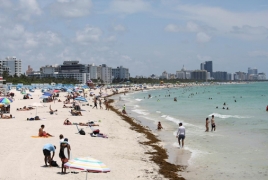Science explains whether summer can slow coronavirus June 11, 2020 - 10:42 AMT PanARMENIAN.Net - The arrival of warmer weather in the Northern Hemisphere raises the question of whether summer could slow the spread of the coronavirus outbreak. In an article, Reuters explains what science has to say. While warmer weather typically ends the annual flu season in temperate zones, climate alone has not stopped the Covid-19 pandemic from sweeping any part of the globe. In fact, outbreaks in hot and sunny Brazil and Egypt are growing. Still, recent data about how sunlight, humidity and outdoor breezes affect the virus gives some reason for optimism that summer could slow the spread. Real-world evidence about the effect of weather on the new virus is mixed. One study of 221 Chinese cities found that temperature, humidity and daylight did not affect speed of spread. Two other studies did find an effect, including a look at new infections in 47 countries that linked higher temperatures to slower transmission in places like the Philippines, Australia and Brazil. In the lab, when temperatures and humidity rise, coronavirus particles on surfaces more quickly lose their ability to infect people - and they are inactivated especially fast when exposed to sunlight, U.S. government researchers found. It is still a good idea for people to wash hands frequently, practice social distancing and wear a mask in summer, experts say. While virus particles coughed or exhaled by an infected person will disperse faster outdoors, one study found a gentle breeze could carry saliva droplets up to 6 m (19.69 feet). Vitamin D: Researchers are investigating whether levels of immunity-regulating vitamin D in people’s blood affect how vulnerable they are to infection with the new coronavirus or how sick they become. The majority of vitamin D in the body comes from skin exposure to sunlight. Pollen: A study in the Netherlands of all “flu-like” illness, including COVID-19, in recent years concludes that pollen concentrations are a better predictor than sunlight of respiratory disease trends. Clouds of pollen act as air filters, snagging virus particles, and pollen activates immune responses, even in people without overt allergies. The study found that flu-like illness started to drop when pollen in the air reached 610 grains per cubic metre, a typical level from early spring to October in most middle latitudes. Photo: REUTERS/Marco Bello Azerbaijani authorities report that they have already resettled 3,000 people in the Nagorno-Karabakh town of Stepanakert. On June 10, Azerbaijani President of Azerbaijan Ilham Aliyev will leave for Turkey on a working visit. Azerbaijani President Ilham Aliyev arrived in Moscow on April 22 to hold talks with Russian counterpart Vladimir Putin. Authorities said a total of 192 Azerbaijani troops were killed and 511 were wounded during Azerbaijan’s offensive. Partner news |